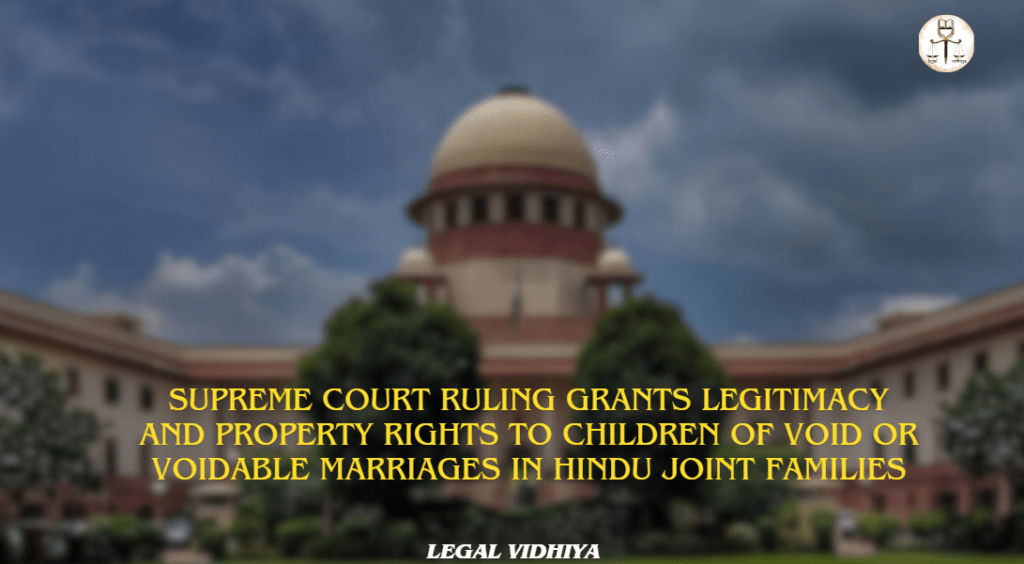
Introduction: In a groundbreaking judgment, the Supreme Court of India, in the case of Revanasiddappa and Anr v. Mallikarjun and Ors, has reshaped the legal landscape concerning the rights of children born from void or voidable marriages within the framework of Hindu joint family property under the Mitakshara system of law. The three-judge bench, led by Hon’ble Chief Justice of India D.Y. Chandrachud, delivered a significant ruling affirming that children born from such marriages are entitled to a share in the property of their deceased parents.
The legal conundrum at the heart of this case revolves around Section 16 of the Hindu Marriage Act, 1955 (HMA), which addresses the legitimacy of children born from void or voidable marriages. While Section 16(1) and Section 16(2) confer legitimacy upon children born from void and voidable marriages, Section 16(3) creates an exception, stating that such children shall not have rights in the property of any person other than their parents. This conflicting provision sparked debates and divergent interpretations among coordinate benches of the Supreme Court. The controversy gained prominence due to conflicting decisions such as the 2010 Bharatha Matha case, which limited the inheritance rights of such children to their father’s self-acquired property, excluding ancestral coparcenary property. However, in a twist of precedent, the Supreme Court in 2011, in an earlier round of the present appeal in Revanasiddappa vs. Mallikarjun, diverged from this ruling, asserting that such children have a claim to both self-acquired and ancestral property. The dispute led to the matter being referred to a larger bench.
Invalid Marriages in Hindu Law: Understanding the implications of the recent Supreme Court judgment requires a grasp of the concept of invalid marriages in Hindu law. Valid marriages adhere to conditions outlined in Section 5 of the HMA, ensuring the consent of both parties, absence of prohibited relationships, and compliance with necessary rituals. Children born from valid marriages generally have inheritance rights to ancestral property. Invalid marriages, categorized as void or voidable under Sections 11 and 12 of the HMA respectively, fail to meet the essential legal conditions. Void marriages result from reasons like bigamy, child marriage, prohibited degrees of relationship, and non-compliance with essential rituals. Voidable marriages, on the other hand, can be annulled due to legal defects or fraud. Historically, children born from such marriages were considered illegitimate and often denied claims to ancestral property, prompting a reevaluation of their legal rights.
The Recent Supreme Court Judgment: The case of Revanasiddappa vs. Mallikarjun centers on the rights of a child born from an invalid marriage within a Hindu joint family setup. The pivotal question before the Supreme Court was whether such a child could claim a share in the ancestral property of the Hindu joint family despite the invalidity of their parents’ marriage. The Supreme Court acknowledged that the child should not suffer due to the invalidity of their parents’ marriage and that denying them a share in ancestral property would be detrimental to their welfare. Emphasizing the legitimacy conferred upon children of void or invalid marriages by statutory provisions, the court cited Section 16(2) of the HMA. This section states that in the case of a voidable marriage subsequently annulled, a child begotten before the annulment is deemed legitimate, extending the same rights and legitimacy under Section 16(1) to children born from marriages declared void as if they were born from valid marriages.
Implications of the Judgment: The Supreme Court’s ruling marks a departure from previous interpretations of the Hindu Marriage Act and the Hindu Succession Act, significantly impacting the legal rights of children born from void or voidable marriages within Hindu joint families. The judgment aligns with the principle of safeguarding the welfare of children and recognizes their legitimacy irrespective of the invalidity of their parents’ marriage. This decision has broader implications for the Hindu joint family property system, challenging historical discriminatory practices against children of void or voidable marriages. It sets a precedent that may influence future cases and legislative considerations, fostering a more inclusive and equitable approach to inheritance rights within the Hindu legal framework.
The Supreme Court’s recent judgment in the Ravanasiddappa vs. Mallikarjun case is a landmark decision that brings clarity to the rights of children born from void or voidable marriages in the context of Hindu joint family property. By emphasizing the legitimacy of such children and extending inheritance rights, the court has addressed a long-standing legal conundrum and set a precedent with far-reaching implications. This ruling not only aligns with the evolving understanding of family dynamics but also underscores the judiciary’s commitment to protecting the rights and welfare of children in the realm of family law.
CASE NAME – Revanasiddappa VS Mallikarjun , on 1st September 2023
Name – Vedika Gupta, B.A.LL.B, Lloyd law college, Legal Inten under legal Vidhiya
Disclaimer: The materials provided herein are intended solely for informational purposes. Accessing or using the site or the materials does not establish an attorney-client relationship. The information presented on this site is not to be construed as legal or professional advice, and it should not be relied upon for such purposes or used as a substitute for advice from a licensed attorney in your state. Additionally, the viewpoint presented by the author is of a personal nature.




1 Comment
CA Rishabh · February 7, 2024 at 6:01 pm
Insightful explanation. Keep it up.